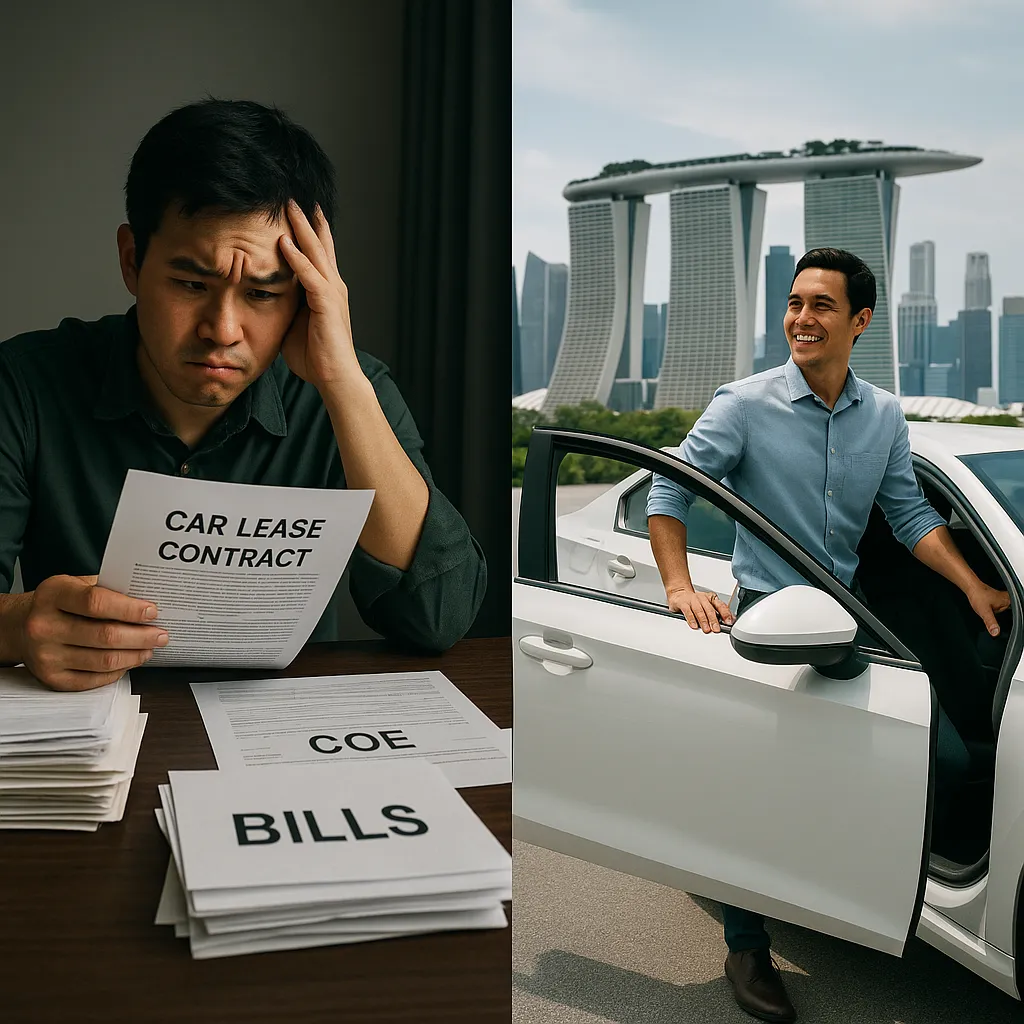
Should You Lease or Rent a Car in Singapore?
Here’s What Makes More Sense in 2025
When it comes to driving in Singapore in 2025, car ownership is off the table for many. With COE prices soaring past $100K, most people are forced to explore alternative options like leasing or long-term rental.
But while both give you access to a car without owning one, they’re not the same, and choosing the wrong one could cost you thousands.
If you're stuck between leasing and renting a car in Singapore, this breakdown will help you choose the smarter, more flexible option based on your lifestyle, budget, and commitment level.
Should You Lease or Rent a Car in Singapore?
Here’s What Makes More Sense in 2025
🚘 What’s the Difference Between Leasing and Renting?
💰 Cost Breakdown: Leasing vs Renting in 2025
If You Rent (e.g. from Stark Rental):
🏆 Who Should Go With Long-Term Rental?
🚘 What’s the Difference Between Leasing and Renting?
Let’s start with the basics:
Car Leasing (in Singapore)
Typically a 2- to 5-year contract
Often requires a large upfront deposit
Fixed monthly repayments
You may be responsible for servicing, road tax, insurance (varies by provider)
Penalties for early termination
Limited flexibility to upgrade/change cars
Long-Term Car Rental
Flexible durations from 1 month to 2+ years
No downpayment, just a security deposit
Fully inclusive pricing: insurance, maintenance, road tax, COE all covered
Easily switch vehicles or cancel with short notice
Perfect for expats, short-term stays, or locals waiting out COE insanity
In short:
📌 Leasing = commitment-heavy
📌 Renting = freedom-focused
💰 Cost Breakdown: Leasing vs Renting in 2025
To keep it apples-to-apples, let’s look at a mid-range car like a Toyota Altis or Honda Vezel.
If You Lease:
Upfront deposit: $5,000 – $10,000
Monthly: $1,300 – $1,600
You may pay separately for:
Insurance
Road tax
Servicing
If You Rent (e.g. from Stark Rental):
Upfront: $0 downpayment (just refundable deposit)
Monthly: $1,200 – $1,800
Everything is included:
Insurance
Maintenance & servicing
COE & road tax
24/7 roadside support
So while pricing looks similar on paper, long-term rental wins with lower upfront costs, zero maintenance responsibility, and full flexibility.
⚠️ What Most People Get Wrong
Many drivers hear “lease” and think they’re getting a better deal than renting, but that’s not always true.
Leasing often locks you into a multi-year contract with limited exit options. And if COE prices crash or your needs change mid-way, you're stuck or hit with massive early termination fees.
Long-term rental, on the other hand, gives you breathing room, you can upgrade, downgrade, or cancel with far less penalty.
✅ Who Should Lease a Car?
Leasing might make sense if:
You’re 100% certain you’ll use the car daily for 3–5 years
You’re OK with taking care of insurance, servicing, and repairs
You don’t plan to switch vehicles or leave Singapore
You want lower monthly payments (in some rare cases)
But for most Singaporeans and expats in 2025, this level of commitment doesn’t make financial sense.
🏆 Who Should Go With Long-Term Rental?
Long-term car rental is a smarter fit if:
You're an expat in Singapore for 1–3 years
You're waiting for COE prices to drop before buying
You need a temporary vehicle for personal or business use
You want zero hassle, no hidden costs, and full flexibility
You don’t want to tie up capital in deposits or loans
Companies like Stark Rental offer fully-inclusive rental plans so you can drive now, and walk away any time.
🔥 Final Verdict: Rent if You Value Flexibility
Let’s cut through it all:
Leasing ties you down.
Renting lets you drive free.
In 2025, flexibility isn’t a luxury, it’s survival. And with COE prices still unstable and the economy shifting, long-term rental gives you the agility to adapt, without sacrificing the convenience of having a car.
If you want to stay mobile, protect your wallet, and avoid ownership stress, renting is the smarter way forward.
👉 Ready to Drive Without Commitment?
Check out flexible, all-inclusive car rental plans at Stark Rental, and find out how easy it is to drive smarter in 2025.
